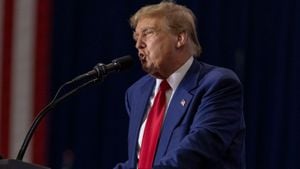With Donald Trump winning another term as President, whispers of changes – particularly within the education sector – have perked up ears across the nation. While some of these proposals raise eyebrows, they also shine light on the expected direction of education policy under his administration, especially potential efforts surrounding the dismantling of the U.S. Department of Education.
Trump's political camp has made forays hinting at sweeping educational reforms. His pick for Secretary of Education, Linda McMahon, brings her own unique history and connections to the table, firmly located within this expected transformation. Formerly the CEO of the WWE, McMahon's appointment suggests education could take center stage, even if it wasn't the highlight of the recent presidential campaign.
Historically, the Department of Education has been considered somewhat of a political lightning rod. It was established during President Jimmy Carter's administration, but ever since, it has faced challenges from critics who argue it symbolizes bureaucratic waste. Trump often links the agency to excessive government meddling, claiming it strays too far from parental control and state governance. He has emphatically communicated his desire to transfer educational governance back to the states, utilizing McMahon's confirmed expertise and connections to spearhead this initiative.
Interestingly, the idea of dismantling the Department of Education isn't new. Republican narratives traced back to Ronald Reagan's presidential campaign underline persistent efforts to eliminate the agency. During his second presidency, Trump seems set to pick up where such conversations left off. If implemented, this radical reshaping of educational oversight would mean the transition of many programs and functions to state control.
This leads to questions about practicality—would eliminating the department itself resolve larger, systemic issues within education? Or would it merely shift problems to state levels? McMahon's educational platform leans heavily toward enhancing charter schools and promoting school choice initiatives. This change could privilege certain demographic groups over others, amplifying educational inequalities.
The ramifications of such changes don't fall solely on students; they concern parents, educators, and communities nationwide. For many, advocacy underlies the protection of federal programs like Title I funding, which directs additional resources to schools serving high-poverty students and safeguarding the rights of students with disabilities via the Individuals with Disabilities Education Act (IDEA). These programs are lifelines, particularly for low-income communities.
Trump's alignment with conservative thought leaders, especially those associated with Project 2025, indicates he may push to broaden the school choice agenda, aiming to install policies offering families greater flexibility with their education options. Here, the specter of federal funds potentially following students instead of institutions arises. This notion might appeal to conservative thinkers who argue for educational efficiency and individual empowerment.
Yet, this plan of attack raises significant fears among education advocates. Cuts loomed over federal funding could strike the heart of support systems currently aiding many vulnerable students. Project 2025’s recommendations include proposals to phase out Title I and eliminate the Head Start early educational assistance program. Such maneuvers would disproportionately impact communities already on the edge, risking widening educational gaps.
When it came to universal free school lunches, another looming issue hangs precariously amid threats of policy rollback under the Trump administration. Increasingly, the Community Eligibility Provision (CEP) has granted access to free meals for millions of low-income students without the need for cumbersome income verification. Should new regulations emerge to tighten eligibility parameters or even nullify the program entirely, anti-hunger advocates warn of detrimental consequences for the very families who would crave access to these resources.
Despite efforts to scale back federal programs, some voices within the education sphere remain hopeful. Federal and state-level voices argue education still possesses room for improvement, even with diminished oversight. They eye state laws and grassroots initiatives with optimism, believing local communities might address student needs more effectively than bureaucratic mechanisms.
Across the nation, reactions to Trump's anticipated proposals remain divided. While his supporters herald the promise of flexibility and local governance as timely reforms, critics perceive imminent dangers, fearing the erosion of established educational protections and equitable funding. The coming months will undoubtedly create intriguing dialogues about the realities of educational access under the Trump administration.
The undercurrents shaping Trump's vision cannot avoid examining the impact on social justice within educational systems. Advocates contend education policy should prioritize inclusivity, equity, and opportunity for marginalized groups—goals achievable through unified, stable federal policies rather than fragmented local governance.
With all this said, what lies ahead for the Department of Education—and education itself—remains uncertain. Linda McMahon’s leadership and the overall approach taken by Trump's second administration will reveal whether the education system will pivot toward decentralization or fight to maintain, and improve upon, federally mandated programs. The stakes are high as America braces itself for potentially unprecedented shifts within the educational arena.
Moving forward, every voice matters. Advocacy will play a key role as families, educators, and community members stand united to safeguard educational access and quality for each and every child, regardless of their socioeconomic status.
The coming years will test the commitment to progressive educational reform against conservative impulses toward deregulation and decentralization. It will also cast light on whether the tension between school choice and equitable access can be balanced without sacrificing anyone on the alter of expedient policy making. Only time will tell.



